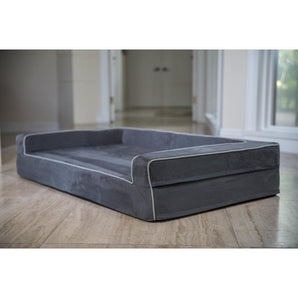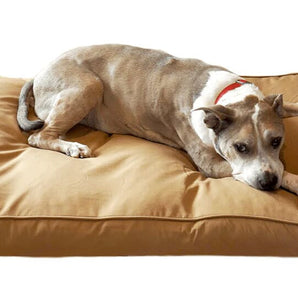
EVERY SCIENTIFIC STUDY OR SLEEP DOCTOR YOU CAN FIND WILL TELL YOU NOT TO LET YOUR PETS SHARE YOUR BED. WHY WE IGNORE ALL THE EVIDENCE.
Haven’t we all craved a “snuggle” with our fur babies? Its comforting…especially if we are sick, or lonely…or just plain want to feel close to our pet. Right?
I did this for many years, then started feeling sleep deprived. So one night I put my pet on a comfy bed by our bed, and …wallah! I slept like a baby.
Its hard to know how many pet owners "co-sleep" with their animals, but two studies presented at last year’s annual meeting of the Associated Professional Sleep Societies confirm what any pet-loving idiot like myself can tell you: There are a lot of us, and we are walking around like zombies. One study surveyed 298 patients at a family practice clinic. About half reported sleeping with pets (more dogs than cats), and of those, nearly a third said they were awakened by their pets at least once per night. Sixty-three percent of respondents who shared a bed with a pet more than four nights a week reported poor sleep quality, as defined by the authoritative and exquisitely dull Pittsburgh Sleep Quality Index. Another paper reported that 10% of pet owners were "annoyed" that their animals sometimes disturbed their sleep.
I’m no scientist, but these figures seem low to me. Then again, I might be a little foggy in the head from sleeping with my pet last night! LOL! .
If you have an annual physical and your doctor asks you “how are you sleeping? And you reply “Not Well”, you may want to consider how your pet factors into that, and how many times you are awaken each night. Even I you have a “king” bed, you still may find that if you set up a time lapse camera, you are all doing the “tango” dance all night long!!
The Division of Sleep Medicine at Harvard Medical School reports cheerily that "a lack of adequate sleep can affect judgment, mood, ability to learn and retain information, and may increase the risk of serious accidents and injury. In the long term, chronic sleep deprivation may lead to a host of health problems including obesity, diabetes, cardiovascular disease, and even early mortality."
One person who reportedly sleeps with his 85-lb. coonhound, claimed: "It destroys our backs. We’re taking steps to convince him to sleep elsewhere, with pretty weak results so far." Another, who sleeps with a much smaller 25-lb. Wheaten, compares it to "trying to share our bed with a piano bench." A third was at least willing to, in the name of God, do something about it. One recent night when her 2-year-old Great Dane jumped on the bed at 2 a.m., she "put up with it for about an hour. Then I got up and went to the couch."
What’s going on here? My own theory is that it’s a long con. Dogs—hey, no disrespect—are the greatest human-manipulators in the history of the planet, which explains their enormous evolutionary success. Maybe they flatter us into believing they need us, they trust us to re-create for them the warmth and security of the litter, where they are instinctive co-sleepers, and this puffs us up and makes us feel godlike. When what they’re really after is what we’re all after: simple creature comfort. What sentient being wouldn’t rather sleep on a downy pillow-top than a floor, or even the most luxurious and expensive dog bed?
Don’t misunderstand. I don’t discount the psychological satisfaction of curling up next to a slumbering dog or, I guess, cat. (Or the literal warmth of it: Our pets’ body temperatures run three to six degrees warmer than our own.) Psychologist Stanley Coren cites speculation among anthropologists that human-animal co-sleeping may even be encoded in our DNA, or theirs. And I have to admit, there is something soothing about hearing my Lab, Amy, snoring quietly next to my bed.
That sense of connection must be some powerful stuff. We must crave it very badly. Maybe the greatest trick the devil ever pulled wasn’t convincing the world he doesn’t exist; maybe it was convincing us to trade our own most basic bodily need, the need for restorative sleep, for a fleeting bit of animal comfort in the night.
This is when a Bully Bed can really come to the rescue WITHOUT taking away the intimacy of sleeping near our pets. We recently added some Bully Beds to our very large bedroom and now our two labs sleep on their own bed, right next to ours. I can literally reach down and pet the top of Amy’s head when I need to…and her soothing “snurggles” are still close enough to be heard. But I am sleeping MUCH BETTER!!!
--Donna Stanley, Endless Mt. Labradors, AKC Breeder of Merit
WHY IT'S SO WRONG—BUT SO RIGHT—TO SLEEP WITH YOUR PETS
EVERY SCIENTIFIC STUDY OR SLEEP DOCTOR YOU CAN FIND WILL TELL YOU NOT TO LET YOUR PETS SHARE YOUR BED. WHY WE IGNORE ALL THE EVIDENCE.
Haven’t we all craved a “snuggle” with our fur babies? Its comforting…especially if we are sick, or lonely…or just plain want to feel close to our pet. Right?
I did this for many years, then started feeling sleep deprived. So one night I put my pet on a comfy bed by our bed, and …wallah! I slept like a baby.
Its hard to know how many pet owners "co-sleep" with their animals, but two studies presented at last year’s annual meeting of the Associated Professional Sleep Societies confirm what any pet-loving idiot like myself can tell you: There are a lot of us, and we are walking around like zombies. One study surveyed 298 patients at a family practice clinic. About half reported sleeping with pets (more dogs than cats), and of those, nearly a third said they were awakened by their pets at least once per night. Sixty-three percent of respondents who shared a bed with a pet more than four nights a week reported poor sleep quality, as defined by the authoritative and exquisitely dull Pittsburgh Sleep Quality Index. Another paper reported that 10% of pet owners were "annoyed" that their animals sometimes disturbed their sleep.
I’m no scientist, but these figures seem low to me. Then again, I might be a little foggy in the head from sleeping with my pet last night! LOL! .
If you have an annual physical and your doctor asks you “how are you sleeping? And you reply “Not Well”, you may want to consider how your pet factors into that, and how many times you are awaken each night. Even I you have a “king” bed, you still may find that if you set up a time lapse camera, you are all doing the “tango” dance all night long!!
The Division of Sleep Medicine at Harvard Medical School reports cheerily that "a lack of adequate sleep can affect judgment, mood, ability to learn and retain information, and may increase the risk of serious accidents and injury. In the long term, chronic sleep deprivation may lead to a host of health problems including obesity, diabetes, cardiovascular disease, and even early mortality."
One person who reportedly sleeps with his 85-lb. coonhound, claimed: "It destroys our backs. We’re taking steps to convince him to sleep elsewhere, with pretty weak results so far." Another, who sleeps with a much smaller 25-lb. Wheaten, compares it to "trying to share our bed with a piano bench." A third was at least willing to, in the name of God, do something about it. One recent night when her 2-year-old Great Dane jumped on the bed at 2 a.m., she "put up with it for about an hour. Then I got up and went to the couch."
What’s going on here? My own theory is that it’s a long con. Dogs—hey, no disrespect—are the greatest human-manipulators in the history of the planet, which explains their enormous evolutionary success. Maybe they flatter us into believing they need us, they trust us to re-create for them the warmth and security of the litter, where they are instinctive co-sleepers, and this puffs us up and makes us feel godlike. When what they’re really after is what we’re all after: simple creature comfort. What sentient being wouldn’t rather sleep on a downy pillow-top than a floor, or even the most luxurious and expensive dog bed?
Don’t misunderstand. I don’t discount the psychological satisfaction of curling up next to a slumbering dog or, I guess, cat. (Or the literal warmth of it: Our pets’ body temperatures run three to six degrees warmer than our own.) Psychologist Stanley Coren cites speculation among anthropologists that human-animal co-sleeping may even be encoded in our DNA, or theirs. And I have to admit, there is something soothing about hearing my Lab, Amy, snoring quietly next to my bed.
That sense of connection must be some powerful stuff. We must crave it very badly. Maybe the greatest trick the devil ever pulled wasn’t convincing the world he doesn’t exist; maybe it was convincing us to trade our own most basic bodily need, the need for restorative sleep, for a fleeting bit of animal comfort in the night.
This is when a Bully Bed can really come to the rescue WITHOUT taking away the intimacy of sleeping near our pets. We recently added some Bully Beds to our very large bedroom and now our two labs sleep on their own bed, right next to ours. I can literally reach down and pet the top of Amy’s head when I need to…and her soothing “snurggles” are still close enough to be heard. But I am sleeping MUCH BETTER!!!




